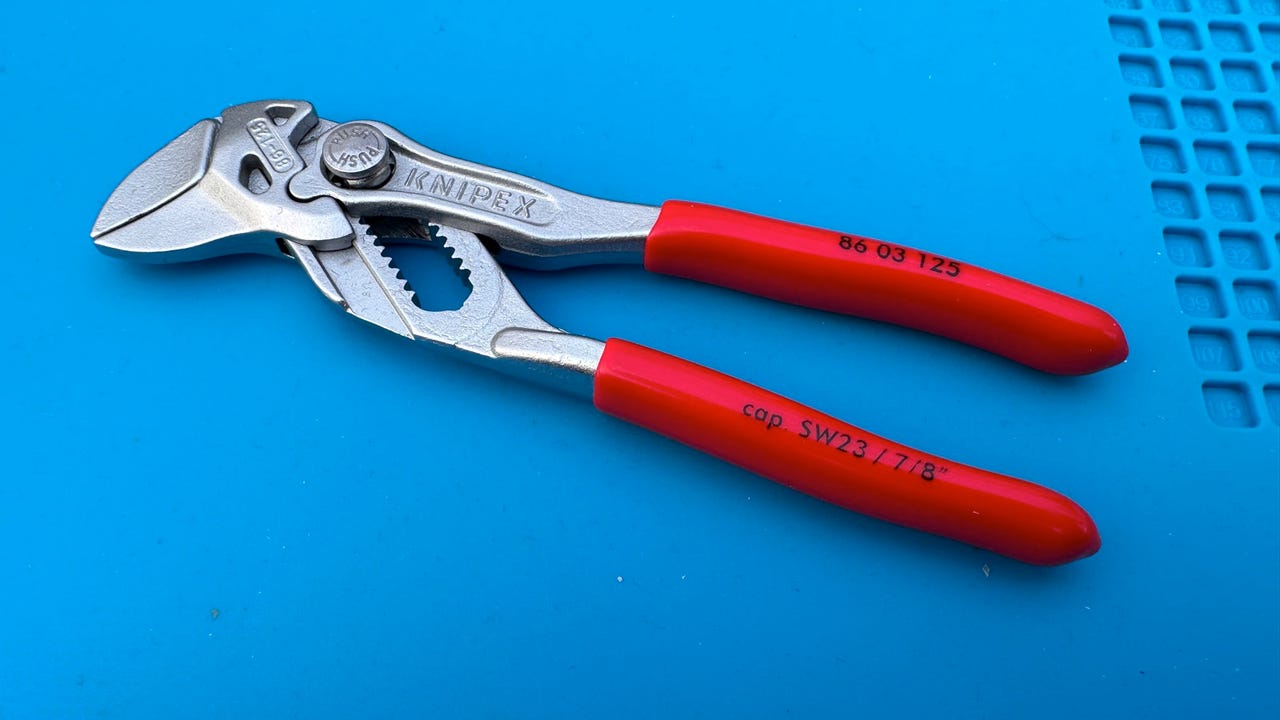
































The thin vinyl coating on these pliers, believe it or not, do not pass safety standards!
Adrian Kingsley-Hughes/Breathing new life into tired items or being able to carry out basic home repairs or improvements is incredibly satisfying. That's why I became enthused by tinkering with things in the first place. But there can be dangers lurking. And that danger is electricity.
Also: This$10 gadget is my favorite repair tool of all time
When it comes to handling electricity, I strongly recommend leaving those tasks to the experts. However, even seemingly simple repairs not directly related to electrical systems can expose you to electrical hazards. I personally know several individuals who have been injured by electricity, and none of them were performing a power-related task. One person struck a cable while drilling, another accidentally touched a live wire with a screwdriver left by the previous occupant, and a third was trying to remove a broken charger from a wall socket.
What's even more alarming is that in two of these cases, the injured individuals believed the power was turned off. This is a chilling reminder of how critical it is to have tools designed for safe use around electricity.
While it's not usually my intent to tinker with electrical systems (though I do hold the necessary U.K. qualifications to carry out some electrical work), I've listed below the protection certifications that you should look for in tools and the tools I personally use for the safest repairs.
There are two certifications to note. The first is the VDE mark.
VDE is an acronym for Verband der Elektrotechnik, an organization that's responsible for testing and certifying tools and appliances. The other is IEC 60900, where IEC is the International Electrotechnical Commission.
Also: Why every tinkerer needs this digital microscope for repairs
Either of these certifications shows that the tool has been designed according to detailed specifications and undergone strenuous testing to ensure that the user is protected from high voltages of up to 1000 volts.
Some tools, such as this Draper Expert set of screwdrivers I own (sold under theOEM Tools brand in the U.S. ), carry both certification marks. While others, such asWiha screwdrivers only have VDE certification. Both are protective enough for safe repairs.
Here's what the VDE and IEC 60900 logos look like.
Adrian Kingsley-Hughes/With either of the two certifications, such tools offer protection from up to 1000V. Here's me holding a screwdriver connected to the 250V mains power.
The same is true for theseKnipex cutters . They are VDE certified to be safe from up to 1000V.
Most tools will clearly state what its maximum voltage endurance is, usually on the handle.
Adrian Kingsley-Hughes/When it comes to multimeters, these use a different rating -- the CAT rating, which stands for Category -- and I will always choose a meter with a CAT III rating or higher. CAT III multimeters, such as thisPokit Pro , are rated to be safe for up to 600V, which is ideal for domestic use.
Pokit Pro multimeter
Adrian Kingsley-Hughes/When it comes to buying tools that are designed to keep you safe from high voltages, I'd always recommend well-known brands. You can't go wrong with brands such as Wiha, Knipex, or Powerbuilt. In fact, Powerbuilt offers a great set ofVDE-rated screwdrivers, pliers, ratchets, and sockets -- everything you need in one kit!
Also: Why I replaced my$40 multimeter with smart measuring tools
As for helping to keep me away from high voltages, a tool that's saved me from an electric shock more than once is a non-contact voltage detector pen, such as theLVD2 from Fluke . This will light up blue when a mains voltage supply is nearby, and red when the pen is close to one.
The Fluke LVD2 picking up a live cable through a wall.
Adrian Kingsley-Hughes/Personally, I use a lot of tools that are certified to keep me safe from mains voltage because they give me a sense of security. They might cost a little more than regular tools, but it's hard to put a price on safety.
 Hot Tags :
Our process
Home & Office
Hot Tags :
Our process
Home & Office